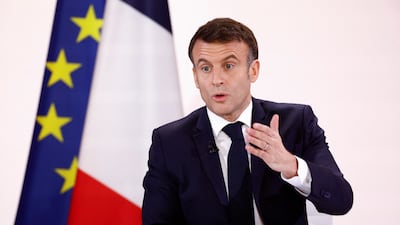Paris stayed out of recent coalition strikes against Houthi militia targets in Yemen in a bid to avoid war spreading further in the Middle East, French President Emmanuel Macron said in a media briefing on Tuesday as he attempted to rally the French public around him ahead of a European election despite controversies already marring his new cabinet.
“We have a posture that seeks to avoid escalation,” said Mr Macron in response to questions about France's decision not to join US and British strikes last week. “We are vigilant and attentive to region’s equilibriums.”
The Houthis have disrupted global trade since November, with dozens of attacks against what they claim are Israel-linked commercial ships in the Red Sea in an attempt to pressure Israel into a ceasefire in Gaza.
The Yemeni group responded to retaliatory US-led bombardments by continuing their attacks and announcing that they would expand them to include US ships.
France’s “positive” decision to stay out of the strikes will preserve its interests in the Red Sea, said the Houthis on Wednesday.
“Our armed forces will target the interests of the countries participating in the aggression against Yemen, and this is a legitimate right,” Houthi political bureau member Mohammad Al Bukhaiti said in a social media post.
Mr Macron said that France’s choice to not be involved in the strikes would not impact its continuing operations to “preserve freedom of navigation” in the Red Sea.
The only EU country with a permanent military base in the Gulf, France deployed its frigate Languedoc to the Red Sea in December to protect civilian ships from Houthi attacks. The Languedoc has since intercepted Houthi drones aimed at commercial tankers.
France is also a member of a US-led naval mission to the region, named Prosperity Guardian, alongside more than 20 other countries.
“We are taking action, but the framework is diplomatic, not military,” said Mr Macron.
But the French president recognised that he had failed so far to convince Israeli Prime Minister Benjamin Netanyahu, whom he talks to “nearly every week”, to implement a ceasefire in Gaza.

More than 24,200 Palestinians have died in Israel’s military operation in the enclave since October 7, when a Hamas-led attack on Israel killed about 1,200.
“All lives are equal,” said Mr Macron, who repeated his call for the establishment of a Palestinian state to bring long-term stability to the region.
A “stronger and fairer” France
But domestic issues overshadowed foreign affairs during Mr Macron’s media briefing, which lasted more than two hours and was broadcast live on eight national television channels.
In an attempt to reinvigorate his mandate, Mr Macron called on the country to unite around him and the new government led by France’s youngest Prime Minister, Gabriel Attal.
Mr Macron peppered his introductory remarks with proposals to reform France’s children and public school system, including limiting screen time, a test roll-out of school uniforms and mandatory theatre and art history classes.
“Each generation needs to learn what the Republic means: a history, obligations, rights, a [common] language,” he said.
Other announcements made by Mr Macron to make France “stronger and fairer” include:
– The suppression of “ineffective norms” that discourage entrepreneurs, industrialists, businessmen and farmers from innovating
– Stricter rules to encourage unemployed people to return to work and limit their ability to refuse job offers
– Shorter but better paid parental leave
– A “national plan” to fight male and female infertility, which he described as “this century’s taboo”
– An increase of anti-drug trafficking police operations to 10 a week, starting next week
– “Radical solutions” for better healthcare services across the country, including better administrative integration for foreign doctors
His announcements came one day after recently appointed Education Minister Amelie Oudea-Castera was forced to apologise after stating that she had chosen to send her son to private school because of a failure to replace absentee teachers at his former public school.
Teachers’ unions heavily criticised Ms Oudea-Castera, who also oversees the organisation of this summer’s Paris Olympic Games, for her apparent attack of the public education system, which she is supposed to defend as part of her job.
The controversy worsened after her son’s former teacher seemed to contradict her statements when she told national daily Liberation that she had not been absent while he was in her class.
TV commentators accused Ms Oudea-Castera of lying and being out of touch with reality.
But the minister was defended by Mr Macron, who said she had been “clumsy” but that he felt “indulgence for her” as he had himself offended people, “in particular women”, at the start of his term in office.


